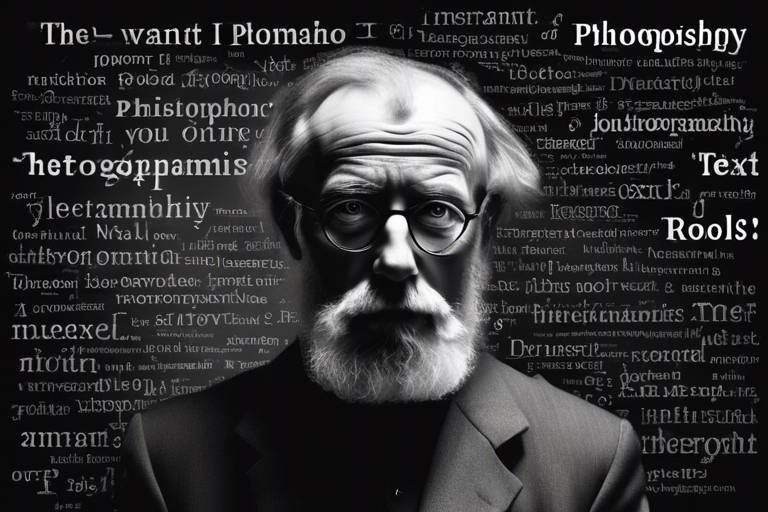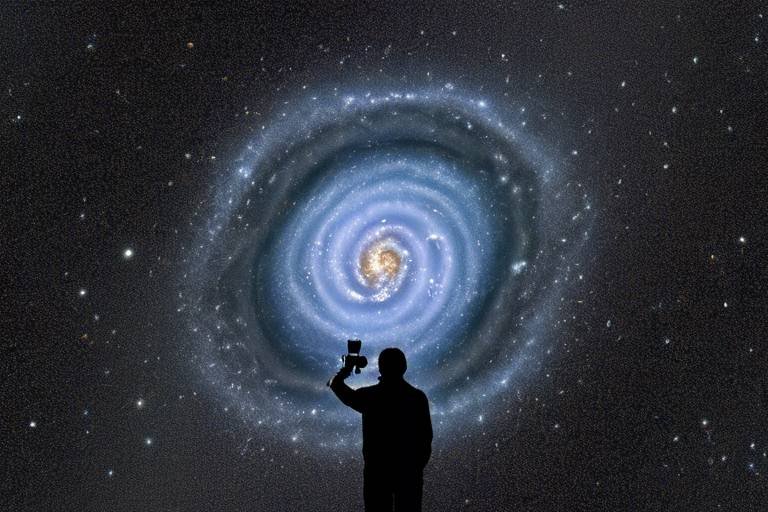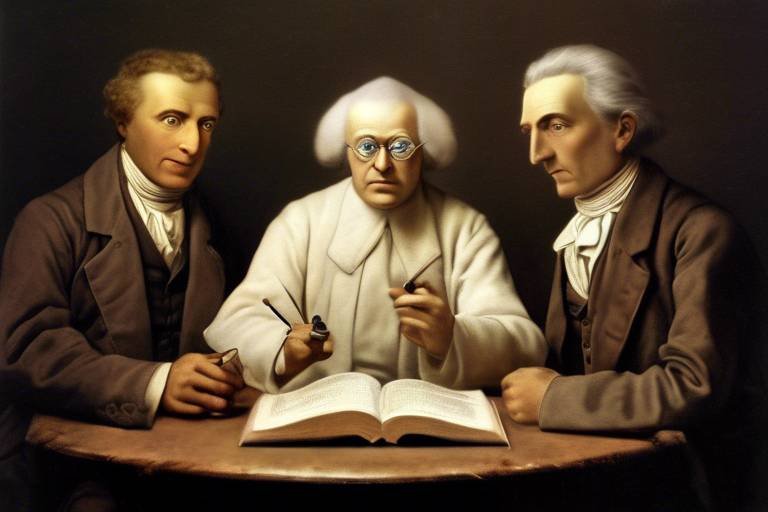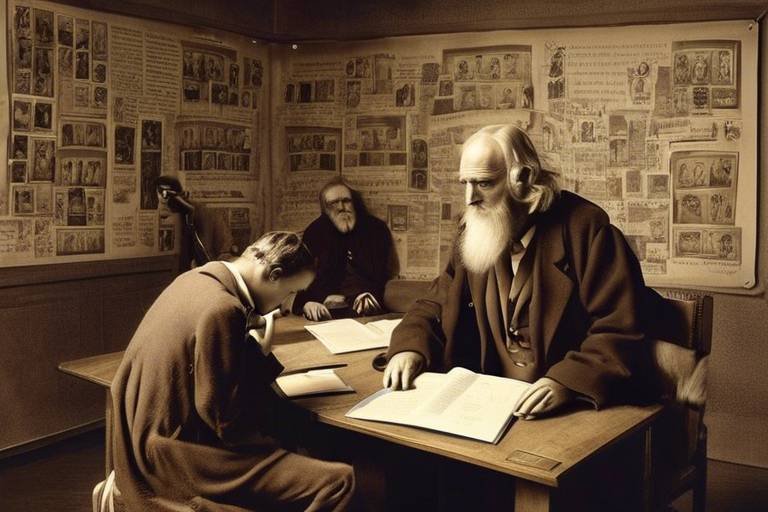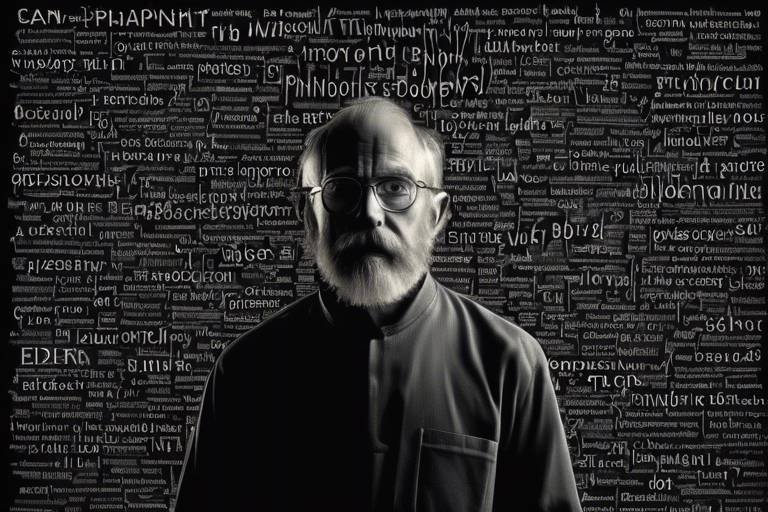The Intersection of Philosophy and Music Theory – A Deeper Look
Welcome to a fascinating journey where two seemingly disparate worlds collide – the realms of philosophy and music theory. At first glance, one might think these disciplines exist in their own silos, with philosophers pondering the essence of existence while musicians compose melodies that resonate with our emotions. But peel back the layers, and you'll discover a rich tapestry of connections that not only enhance our understanding of each field but also reflect the intricate nature of human experience.
So, how do philosophy and music theory intertwine? To grasp this, we first need to explore the philosophical foundations of music. Think of music as a language of its own, a medium that transcends words and speaks directly to our souls. Various philosophical theories, particularly in the realms of aesthetics and metaphysics, provide frameworks that help us understand not just what music is, but why it matters to us as human beings. For instance, the aesthetic theory posits that beauty is a subjective experience, which means that what moves one person might leave another indifferent. This subjective nature of music invites us to reflect on our personal experiences and how they shape our interpretations of sound.
Moreover, music serves as a powerful form of expression. Have you ever listened to a song and felt as if the artist was articulating your deepest emotions? That's the magic of music; it encapsulates complex feelings and ideas that often elude verbal description. Philosophically, this raises questions about the nature of human expression and communication. Music can act as a bridge, connecting us to others and to our own inner landscapes. It’s a bit like a mirror reflecting our emotions back to us, allowing for a deeper understanding of ourselves and our place in the world.
When we delve into the philosophical foundations of music, we find ourselves grappling with profound questions. What is the essence of music? Is it merely a collection of sounds, or does it carry deeper meanings? These inquiries lead us into the realms of aesthetics and metaphysics, where thinkers from Plato to Nietzsche have pondered the significance of art in human life. For example, Plato viewed music as a tool for moral education, suggesting that the harmony of musical scales could influence the harmony of the soul. Such philosophical perspectives not only enrich our understanding of music but also challenge us to consider its broader implications in society.
As we transition into the discussion of music as a form of expression, it’s essential to acknowledge that music is not just an art form; it's a language that conveys emotions that words often fail to capture. When a musician strums a guitar or plays a piano, they are not just creating sounds; they are sharing their innermost thoughts and feelings. This leads us to ponder: how do emotions manifest in music? This question is at the heart of our exploration of the philosophical implications of emotion in music.
Emotion plays a pivotal role in how music is created and experienced. Think about the last time a song moved you to tears or made you want to dance. These emotional responses are not coincidental; they are intricately woven into the fabric of music itself. Different musical elements, such as tempo, harmony, and dynamics, evoke specific feelings. For instance, a slow, minor-key piece might evoke sadness, while a fast, major-key composition might inspire joy. Philosophically, this raises questions about the nature of emotion: can music truly express what we feel, or does it merely reflect our emotional states?
To analyze how different musical elements evoke emotional responses, we can look at a few key factors:
| Musical Element | Emotional Response |
|---|---|
| Tempo | Fast tempos often elicit excitement or happiness, while slow tempos can evoke sadness or reflection. |
| Key | Major keys tend to sound bright and cheerful, whereas minor keys often sound somber or melancholic. |
| Dynamics | Sudden changes in volume can create tension or surprise, enhancing the emotional impact of a piece. |
The philosophy of aesthetics also plays a crucial role in shaping our understanding of beauty and taste in music. What makes a piece of music "beautiful"? This question has perplexed thinkers for centuries. Some argue that beauty lies in the complexity of a composition, while others believe it resides in its emotional resonance. Regardless of the perspective, the aesthetic experience of music invites us to engage with it on a deeper level, prompting us to reflect on our own tastes and preferences.
As we navigate the intersection of philosophy and music theory, we cannot overlook the ethical considerations surrounding music creation. In today's digital age, issues like authenticity and cultural appropriation have become hot topics. Musicians often grapple with their moral responsibilities, particularly when drawing inspiration from cultures that are not their own. This raises important questions: What does it mean to honor the roots of a musical style? How can artists navigate the fine line between inspiration and appropriation?
Furthermore, the philosophical implications of copyright laws in music invite us to question the very concepts of ownership and creativity. In a world where music can be easily shared and replicated, what does it mean to "own" a piece of art? This topic is increasingly relevant as we witness the rise of digital platforms that challenge traditional notions of authorship.
Finally, we must explore how music influences social change and reflects societal values. Throughout history, music has served as a powerful vehicle for activism, giving voice to marginalized communities and pushing for social justice. Philosophically, this ties into concepts of ethics and morality, as music often mirrors the struggles and triumphs of society. It raises the question: can music change the world? Many would argue that it has the potential to inspire, unite, and provoke thought, making it an essential part of the human experience.
As we look to the future, the relationship between philosophy and music theory continues to evolve. Advancements in technology and shifts in cultural perspectives will undoubtedly shape how we understand and create music. Will AI-generated compositions spark new philosophical debates about creativity? Will new genres emerge that challenge our aesthetic sensibilities? The possibilities are endless, and as we embrace this ever-changing landscape, we must remain open to the profound connections that music and philosophy can offer.
- How does philosophy enhance our understanding of music? Philosophy provides a framework for exploring the deeper meanings and implications of music, enriching our appreciation and experience.
- Can music communicate emotions effectively? Yes, music has a unique ability to convey complex emotions that words often cannot express.
- What ethical considerations should musicians keep in mind? Musicians should consider issues of authenticity, cultural appropriation, and the moral implications of their work.
- How can music impact social change? Music can serve as a powerful tool for activism, reflecting and influencing societal values and movements.

Philosophical Foundations of Music
When we dive into the , we're not just scratching the surface; we're embarking on a journey that intertwines the very essence of human experience with the intricate patterns of sound. Music, in its myriad forms, has long been a subject of philosophical inquiry, raising questions about its nature, significance, and role in our lives. Philosophers throughout history have pondered over the meaning of music, its capacity to convey emotions, and its impact on our understanding of reality.
One of the key philosophical theories that provides a framework for understanding music is aesthetics. Aesthetics is the branch of philosophy that deals with the nature of beauty and taste, and when applied to music, it invites us to consider what makes a piece of music beautiful or meaningful. Think about it: have you ever listened to a symphony that moved you to tears? Or a pop song that made you feel elated? These responses are not just personal; they are deeply rooted in philosophical concepts that explore how we perceive and appreciate art.
Moreover, the metaphysical aspect of music raises intriguing questions. What is the essence of music? Is it merely a collection of sounds, or does it transcend the auditory experience? Some philosophers argue that music exists in a realm beyond the physical, where it can evoke feelings and thoughts that are difficult to articulate. This leads us to consider the ontological status of music—is it a tangible entity, or is it an abstract idea that we experience through performance and listening?
In addition to aesthetics and metaphysics, we must also explore the ethical dimensions of music. Music is not created in a vacuum; it is influenced by cultural, social, and historical contexts. This brings forth questions about authenticity and cultural appropriation. For instance, when a musician draws inspiration from a genre rooted in a specific culture, where do we draw the line between appreciation and appropriation? These ethical considerations challenge us to think critically about the responsibilities of musicians and the impact of their work.
As we delve deeper into the philosophical foundations of music, it becomes clear that this art form is more than just entertainment. It serves as a reflection of human experience, a medium through which we can explore complex emotions and ideas. By examining the connections between music and philosophy, we enrich our understanding of both disciplines, revealing how they influence and enhance one another.
- What is the relationship between philosophy and music? Philosophy provides a framework for understanding the significance, beauty, and ethical implications of music, enriching our appreciation and comprehension of this art form.
- How does aesthetics influence music? Aesthetics shapes our perception of beauty in music, guiding how we evaluate and appreciate various musical compositions and styles.
- What ethical issues are associated with music creation? Issues such as cultural appropriation, authenticity, and the moral responsibilities of musicians are central to the ethics of music creation.

Music as a Form of Expression
Music is not just an arrangement of notes and rhythms; it is a powerful medium that allows individuals to express their innermost thoughts and emotions. Think about it: when words fail, music speaks. It transcends language barriers and cultural differences, creating a universal language that resonates with the human experience. Whether it's the joyful strumming of a guitar or the melancholic notes of a piano, each musical composition tells a story, evoking feelings that words alone often cannot capture.
At its core, music serves as a reflection of our emotions. Just as a painter uses colors to convey feelings on canvas, musicians use melodies, harmonies, and rhythms to express complex ideas. This relationship between music and emotion is deeply philosophical, inviting us to ponder questions like: What does it mean to feel? and How can sound evoke such profound emotional responses? When we listen to a symphony, we are not merely hearing notes; we are experiencing a journey through the composer’s emotional landscape.
Consider the different genres of music, each with its own unique way of expressing feelings. For instance:
- Classical music often conveys a range of emotions from joy to sorrow through intricate compositions.
- Jazz embodies spontaneity and improvisation, allowing musicians to express themselves in the moment.
- Rock music channels rebellion and raw energy, often reflecting societal struggles and personal angst.
This variety in musical expression aligns with philosophical inquiries into the nature of human expression and communication. Music can articulate what we cannot say in words, serving as a bridge between the inner self and the external world. It's like having a conversation without uttering a single word, where each note and pause conveys meaning.
Moreover, the emotional responses to music are not just individual; they are also collective. When a group of people gathers to listen to a powerful anthem, the shared experience can create a sense of community and connection. This phenomenon raises another intriguing question: How does music shape our social identities? The communal aspect of music can foster unity, allowing people to bond over shared feelings and experiences.
In exploring the role of emotion in music, we must also consider the philosophy of aesthetics. What makes a piece of music beautiful? Is it the technical skill of the musician, the emotional depth of the composition, or the cultural context in which it was created? These questions reflect the intricate relationship between music and aesthetics, influencing how we compose and appreciate music.
Ultimately, music is a profound form of expression that invites us to explore the depths of our emotions and the complexities of human experience. It encourages us to listen, to feel, and to connect with ourselves and others in ways that transcend the limitations of language.
- How does music affect our emotions?
Music can evoke a wide range of emotions, from happiness to sadness, by triggering responses in our brain that are linked to memory and experience. - Can music be considered a universal language?
Yes, music transcends cultural and linguistic barriers, allowing people from different backgrounds to connect and communicate through shared emotional experiences. - What is the role of improvisation in music?
Improvisation allows musicians to express themselves spontaneously, creating a unique and personal experience for both the performer and the audience.

The Role of Emotion in Music
Have you ever felt a chill run down your spine when a particular song plays? Or perhaps you’ve found yourself lost in thought, reminiscing about a moment in your life, all triggered by a melody? This profound connection between emotion and music is not just a coincidence; it’s a fascinating intersection of art and philosophy that has intrigued thinkers for centuries. Music is often regarded as the universal language, transcending words to convey feelings that are sometimes too complex to articulate. But what exactly is happening when we listen to music that stirs our emotions?
At its core, music serves as a powerful medium for expressing a wide range of emotions. From the joyful exuberance of a lively dance tune to the melancholic strains of a slow ballad, music encapsulates the essence of human experience. Philosophers like Friedrich Nietzsche have argued that music is the highest form of art because it connects us to our innermost feelings. It’s as if music has the ability to peel back the layers of our psyche, exposing raw emotions that we might otherwise keep hidden.
When we delve deeper into the philosophical implications of emotion in music, we find that different musical elements play a crucial role in how feelings are conveyed and interpreted. For instance, consider the following elements:
- Melody: The tune of a song often evokes immediate emotional responses; a soaring melody can uplift, while a descending one might bring a sense of sadness.
- Harmony: The combination of different musical notes can create feelings of tension or resolution, much like the ebb and flow of emotions in our lives.
- Rhythm: The pace and beat of a piece can energize us or calm us down, influencing our mood in profound ways.
These elements work together to create a tapestry of sound that resonates with our emotions, making music a unique form of communication. But how do we interpret these feelings? This question leads us to the realm of philosophical inquiry. Theories of emotion suggest that our personal experiences and cultural backgrounds shape how we perceive music. For example, a piece that evokes joy in one culture might provoke sadness in another. This subjectivity is what makes the study of music and emotion so rich and complex.
Moreover, the emotional responses to music can also be linked to the concept of empathy. When we listen to a song that expresses pain or joy, we often find ourselves empathizing with the artist, as if we are sharing in their emotional journey. This connection can be incredibly powerful, allowing listeners to feel understood and less alone in their experiences. It’s a testament to the idea that music not only reflects our emotions but also has the potential to heal and bring people together.
In summary, the role of emotion in music is a profound exploration of how sound can encapsulate the human experience. It invites us to consider not just what we hear, but what we feel. As we navigate through life, music remains a steadfast companion, echoing our joys, sorrows, and everything in between. So the next time you find yourself swaying to a tune or tearing up at a poignant lyric, remember that you’re engaging in a timeless dialogue between art and emotion—a dialogue that has shaped humanity since the dawn of time.
- Why do certain songs make us feel a specific emotion?
The combination of musical elements like melody, harmony, and rhythm can evoke particular emotions, often influenced by personal experiences and cultural contexts.
- Can music actually change our mood?
Yes! Music has the power to uplift, calm, and even energize us, making it a valuable tool for emotional regulation.
- Is there a universal emotional response to music?
While some emotional responses may be shared across cultures, much of our interpretation of music is subjective and shaped by individual experiences.

Emotional Responses to Music
When you think about music, what comes to mind? Is it the catchy melody that gets stuck in your head, or perhaps the lyrics that resonate with your life experiences? Music is more than just sound; it's a powerful medium that evokes emotions and stirs the soul. The relationship between music and emotion is a fascinating exploration that intertwines both philosophy and psychology, revealing how our feelings are intricately linked to the notes we hear.
At the heart of this connection lies the concept of emotional responses. When we listen to a piece of music, our brains engage in a complex dance of interpretation and feeling. Have you ever felt a wave of nostalgia wash over you when a particular song plays? This isn't just coincidence; it's a reflection of how music can trigger memories and emotions stored deep within us. The philosophical implications of this phenomenon are profound. They suggest that music is not merely an art form but a vehicle for emotional expression and communication.
To understand how music elicits emotional responses, we can look at various musical elements. For instance, the tempo of a piece can significantly influence how we feel. Fast tempos often evoke feelings of excitement or joy, while slow tempos may induce sadness or contemplation. Similarly, the use of harmony and dissonance can create tension or resolution, manipulating our emotional state. Here’s a brief overview of how different elements of music affect our emotions:
| Musical Element | Emotional Response |
|---|---|
| Tempo | Fast Excitement; Slow Sadness |
| Harmony | Consonance Peace; Dissonance Tension |
| Dynamics | Loud Joy; Soft Introspection |
This interplay between music and emotion leads us to ponder a crucial question: What makes a musical piece resonate with us on a personal level? The answer often lies in our individual experiences and the cultural context we inhabit. Music serves as a mirror, reflecting our joys, sorrows, and everything in between. It’s no wonder that philosophers have long debated the essence of music and its impact on the human condition.
Furthermore, the act of listening to music is an inherently subjective experience. What brings tears to one person’s eyes might leave another feeling indifferent. This subjectivity highlights the philosophical discourse surrounding aesthetics and the nature of beauty in music. As we engage with different genres and styles, we also engage with diverse emotional landscapes, making music a universal yet deeply personal experience.
As we continue to explore the emotional responses to music, it becomes clear that this relationship is not just about the notes and rhythms. It’s about connection, understanding, and the shared human experience. Whether it's a heart-wrenching ballad or an upbeat anthem, music has the power to touch our hearts and minds, offering a glimpse into the complexities of our emotions.
- Why do certain songs make us cry? Music can trigger memories and emotions, often leading to tears as we connect with the feelings the song evokes.
- Can music influence our mood? Absolutely! Different tempos and styles can uplift us or bring us down, showcasing music's powerful effect on our emotional state.
- Is there a universal emotional response to music? While some emotional responses may be common, individual experiences and cultural backgrounds greatly influence how we perceive music.

Philosophy of Aesthetics in Music
The philosophy of aesthetics in music is a fascinating exploration of what makes music beautiful, meaningful, and impactful. At its core, aesthetics examines the nature of beauty and taste, and when applied to music, it invites us to ponder questions like: What is it that makes a piece of music resonate with us? Why do certain melodies evoke profound emotions while others fade into the background? These inquiries are not just academic; they touch on our very human experiences and the ways we connect with sound.
Throughout history, various thinkers have contributed to our understanding of musical aesthetics. For instance, the ancient Greek philosopher Plato viewed music as a powerful tool for moral education, believing that it could shape the character of individuals. In contrast, the German composer and philosopher Friedrich Nietzsche celebrated music as a form of raw expression, a way to convey the depths of human experience beyond mere words. This duality highlights the rich tapestry of thought surrounding music's aesthetic value.
When we delve deeper into the philosophy of aesthetics in music, we encounter several key concepts:
- Beauty: What constitutes beauty in music? Is it the complexity of a composition, the emotional depth, or perhaps the cultural context?
- Form: How do the structures of music—such as harmony, rhythm, and melody—contribute to its aesthetic appeal?
- Experience: How do listeners' backgrounds, emotions, and expectations shape their perception of music?
Moreover, the aesthetic experience of music is not just about the notes and rhythms; it encompasses the entire context in which music is created and consumed. For example, consider how a live concert can amplify the emotional impact of a song compared to listening to a recording at home. The atmosphere, the audience's energy, and the performer’s presence all play a significant role in shaping our aesthetic experience.
In contemporary discussions, the philosophy of aesthetics also grapples with the implications of technology on music. With the rise of digital platforms, anyone can create and share music, leading to a democratization of the art form. However, this also raises questions about the standards of quality and authenticity. Are we losing the essence of what makes music beautiful in the quest for mass appeal? Or are we simply broadening our definitions of beauty to include more diverse expressions?
Ultimately, the philosophy of aesthetics in music encourages us to engage with the art form on a deeper level. It challenges us to reflect on our personal tastes, the cultural influences that shape our listening habits, and the emotional landscapes that music can traverse. As we navigate this rich interplay of ideas, we find that music is not just a collection of sounds; it is a profound expression of human experience, a mirror reflecting our joys, sorrows, and everything in between.
- What is the philosophy of aesthetics in music? It is the study of the nature of beauty, taste, and artistic value in music, exploring how these concepts influence our experience and interpretation of music.
- How does cultural context affect musical aesthetics? Cultural context shapes our understanding and appreciation of music, influencing what we consider beautiful or meaningful based on societal norms and personal experiences.
- Can technology change the way we perceive music's beauty? Yes, technology can broaden access to music and alter our listening experiences, leading to new definitions of beauty and artistic expression.

Music Theory and Structure
When we dive into the realm of music theory, we're not just talking about notes and scales; we're exploring a rich tapestry of ideas that intertwine with the very fabric of our reality. Music theory serves as the backbone of musical composition, providing a structured approach to understanding how sounds interact, resonate, and evoke emotions. Just as a painter uses a palette of colors to create a masterpiece, musicians utilize the principles of music theory to craft their sonic landscapes.
At its core, music theory encompasses various elements such as melody, harmony, rhythm, and form. Each of these components plays a crucial role in shaping the overall impact of a musical piece. For instance, melody is often seen as the soul of the music, the part that you hum along to, while harmony adds depth and richness, creating a fuller sound. Rhythm, on the other hand, gives music its pulse, keeping listeners engaged and moving. When combined, these elements create a structure that can be analyzed, understood, and appreciated.
To illustrate this connection between music theory and philosophical ideas, consider the following table that outlines the relationship between musical elements and their philosophical counterparts:
| Musical Element | Philosophical Concept | Explanation |
|---|---|---|
| Melody | Identity | Melody represents the unique voice of a piece, much like how identity shapes our understanding of self. |
| Harmony | Unity | Harmony reflects the idea of unity in diversity, bringing together different notes to create a cohesive sound. |
| Rhythm | Time | Rhythm embodies our perception of time, influencing how we experience and interpret musical flow. |
| Form | Structure | Musical form represents the structural integrity of a composition, paralleling the philosophical exploration of order and chaos. |
These connections highlight how music theory is not merely a technical discipline; it is a philosophical exploration of human experience. The structure of music can be likened to the structure of thought, where ideas are organized and presented in a way that resonates with listeners. Just as philosophers have pondered the nature of existence and reality, musicians grapple with how to convey complex emotions and narratives through their compositions.
Moreover, the study of music theory encourages us to reflect on the nature of reality. When we analyze how different musical structures evoke specific feelings or thoughts, we begin to understand the profound impact of music on our lives. For instance, a simple chord progression can evoke feelings of nostalgia or joy, while a complex rhythmic pattern might challenge our perception of time and space. This intricate relationship between music and philosophy invites us to question not only how we create music but also how we experience it.
In conclusion, the intersection of music theory and structure with philosophical ideas opens up a vast landscape of inquiry. It encourages us to think critically about the music we create and consume, prompting us to explore deeper meanings and connections. As we continue to unravel the complexities of music, we also delve into the very essence of what it means to be human, making this exploration not just academic but profoundly personal.

Ethics and Music Creation
In the vibrant world of music, where creativity knows no bounds, the ethical landscape is as intricate as the melodies we cherish. As musicians craft their art, they often find themselves at a crossroads of authenticity, cultural appropriation, and the moral responsibilities that come with their creations. It's a fascinating intersection that not only affects the artists but also resonates deeply with listeners and society at large. So, what does it mean to create music ethically in today's complex cultural climate?
At the heart of this discussion lies the concept of authenticity. Musicians frequently draw inspiration from various genres and cultures, but the question arises: when does inspiration cross the line into appropriation? Cultural appropriation occurs when elements of a marginalized culture are adopted by members of a dominant culture without understanding or respecting their original significance. This can lead to a dilution of the cultural meaning behind the music, resulting in a loss of identity for the original creators. As artists, it becomes crucial to navigate this landscape thoughtfully, ensuring that their work honors the traditions they draw from rather than exploits them.
Moreover, the digital age has introduced new ethical dilemmas, particularly surrounding copyright and ownership. With the ease of sharing and remixing music online, the lines of ownership have blurred. Musicians often grapple with the question of how to protect their work while also recognizing the collaborative nature of music creation. Copyright laws are designed to safeguard artists, but they can also stifle creativity if taken too far. The challenge lies in finding a balance that respects individual contributions while fostering a spirit of collaboration.
In addition to these concerns, the social impact of music cannot be understated. Music has the power to inspire change, challenge societal norms, and reflect the values of a community. As such, musicians hold a significant responsibility to consider the messages they convey through their art. Are they promoting positive social change, or are they perpetuating harmful stereotypes? This ethical reflection is vital, as the music created today will shape the cultural landscape of tomorrow.
To further illustrate these points, consider the following table that outlines key ethical considerations in music creation:
| Ethical Consideration | Description |
|---|---|
| Authenticity | Respecting the origins and significance of cultural elements in music. |
| Cultural Appropriation | Understanding the difference between appreciation and appropriation in music. |
| Copyright and Ownership | Navigating the complexities of protecting creative work in a digital age. |
| Social Responsibility | Considering the societal impact of musical messages and themes. |
Ultimately, the ethics of music creation are as dynamic as the art form itself. Musicians today are tasked with not only creating captivating sounds but also with ensuring their work contributes positively to the cultural dialogue. As we listen to music, we must also engage with these ethical considerations, recognizing that every note played can influence perceptions, foster understanding, and inspire change.
- What is cultural appropriation in music? Cultural appropriation in music refers to the adoption of elements from one culture by artists from another, often without understanding or respecting the original context.
- How can musicians ensure they are being authentic? Musicians can ensure authenticity by deeply researching the cultures they draw from, collaborating with artists from those cultures, and being mindful of the messages they convey.
- What are the ethical implications of copyright laws? Copyright laws are meant to protect artists, but they can also limit creativity and collaboration. It's essential for musicians to find a balance that allows for both protection and innovation.
- Why is social responsibility important for musicians? Social responsibility is crucial because music has the power to shape cultural narratives and influence public opinion. Musicians should consider the impact of their messages on society.

Copyright and Ownership
The world of music is not just a realm of creativity and expression; it is also a complex landscape where copyright and ownership play crucial roles. When we think about music, we often envision the melodies, harmonies, and rhythms that resonate with our emotions. However, behind every catchy tune or profound lyric lies a web of legal and ethical considerations that shape how music is created, shared, and consumed. This is especially true in our digital age, where the boundaries of ownership are increasingly blurred.
Copyright laws are designed to protect the rights of creators, ensuring that musicians receive recognition and compensation for their work. But what does ownership really mean in this context? Is it merely about having the legal right to profit from a song, or does it encompass a deeper philosophical question about the nature of creativity itself? Many argue that music, much like any form of art, is a reflection of collective human experience, and thus, the idea of ownership can feel somewhat paradoxical.
In the digital age, the rise of streaming services and social media has transformed how we consume music. With just a click, we can access millions of songs, but this convenience raises pressing questions about authenticity and credit. For instance, when a song goes viral on platforms like TikTok, who truly owns the essence of that song? The original artist? The person who created the viral trend? Or perhaps the platform itself? These questions highlight the ongoing philosophical debate surrounding ownership in a world where music is constantly remixed, sampled, and reinterpreted.
Moreover, the issue of cultural appropriation complicates the conversation about ownership. When artists borrow elements from different cultures, they must navigate the fine line between appreciation and exploitation. This raises ethical questions: Are they honoring the original culture, or are they simply profiting from it without proper acknowledgment? The philosophical implications of these actions can lead to broader discussions about respect, representation, and the moral responsibilities of musicians.
To better understand the relationship between copyright, ownership, and music, let’s look at the following table that outlines key aspects of copyright laws:
| Aspect | Description |
|---|---|
| Duration of Copyright | Typically lasts for the life of the creator plus 70 years. |
| Rights Granted | Includes the right to reproduce, distribute, perform, and display the work. |
| Fair Use | Allows limited use of copyrighted material without permission for purposes like criticism, comment, news reporting, teaching, scholarship, or research. |
| Public Domain | Works for which copyright has expired or was never established, allowing free use by the public. |
As we navigate this intricate landscape of copyright and ownership, it becomes clear that the implications extend far beyond legalities. They touch upon our fundamental beliefs about creativity, community, and the very essence of what it means to create art. As musicians continue to push boundaries and redefine genres, the dialogue surrounding ownership will undoubtedly evolve, prompting us to rethink our understanding of music in the context of both personal expression and collective heritage.
- What is copyright in music? Copyright in music refers to the legal protection granted to creators of original works, allowing them to control the use and distribution of their music.
- How long does copyright last? Copyright typically lasts for the life of the creator plus an additional 70 years.
- What is cultural appropriation in music? Cultural appropriation in music occurs when artists borrow elements from another culture, often without permission or proper acknowledgment.
- Can music be used without permission? Under certain circumstances, such as fair use, music may be used without permission, but this is a complex legal area.
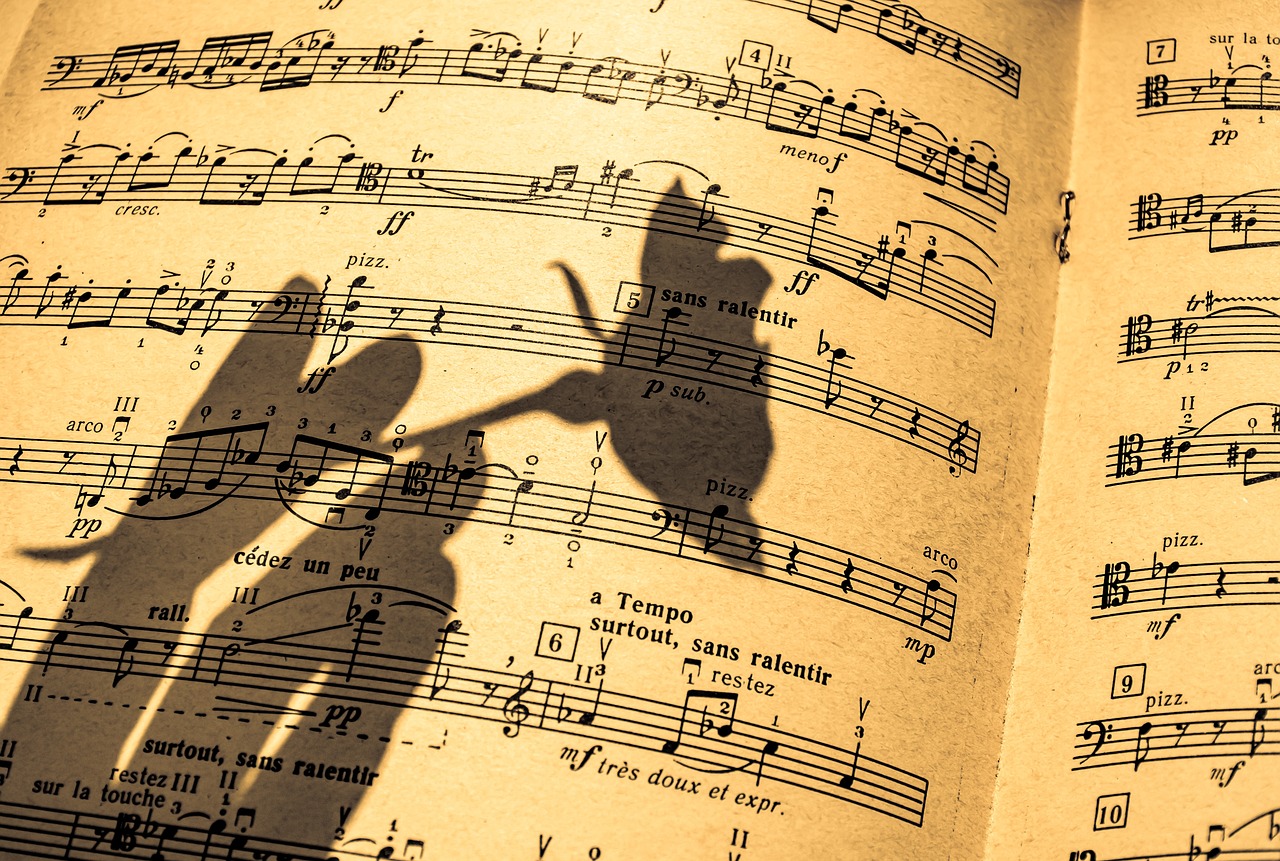
Social Impact of Music
Music is more than just a sequence of notes; it's a powerful catalyst for social change and a mirror reflecting societal values. Throughout history, music has played a pivotal role in movements, serving as a voice for the voiceless and a rallying cry for justice. Think of the protest songs of the 1960s—artists like Bob Dylan and Joan Baez used their music to challenge the status quo, bringing attention to civil rights and anti-war sentiments. It’s fascinating how a simple melody can ignite passion and inspire action, isn’t it?
Moreover, music has the unique ability to cross cultural barriers, uniting people from diverse backgrounds. When we listen to a song, we often find ourselves connecting with the emotions and experiences expressed, regardless of the artist's origin. This universal language fosters empathy and understanding, making it a crucial tool for promoting social harmony. For instance, genres like reggae and hip-hop have roots in specific cultural contexts yet have transcended their origins to resonate with global audiences, often addressing themes of struggle and resilience.
However, the impact of music on society isn't solely positive. It can also reflect and perpetuate negative stereotypes or promote divisive ideologies. For example, certain genres may glorify violence or misogyny, prompting debates about the responsibilities of artists in shaping public perception. This raises important questions: Should artists be held accountable for the messages in their music? How does the media amplify or diminish these messages? As we navigate these complex issues, it becomes clear that music is a double-edged sword, capable of both uplifting and harming society.
To illustrate the multifaceted relationship between music and social issues, consider the following table that highlights key genres and their social impacts:
| Music Genre | Social Impact |
|---|---|
| Folk | Promotes social justice and awareness of political issues. |
| Hip-Hop | Addresses systemic inequalities and personal struggles, often empowering marginalized voices. |
| Reggae | Advocates for peace, love, and social change, rooted in the Rastafarian movement. |
| Rock | Challenges societal norms and often serves as an anthem for rebellion. |
In conclusion, the social impact of music is profound and multifaceted. It has the power to inspire movements, foster unity, and challenge societal norms, but it also carries the weight of responsibility. As listeners, we must remain critical of the messages conveyed through music and consider how they align with our values and beliefs. Ultimately, music is not just an art form; it’s a reflection of our collective consciousness, shaping and being shaped by the world around us.
- How does music influence social movements? Music often serves as a rallying cry, uniting individuals under a common cause and providing a means of expression for shared struggles.
- Can music change societal norms? Yes, music has the ability to challenge existing norms and provoke thought, leading to shifts in public perception and behavior.
- What role does music play in cultural identity? Music is a key component of cultural identity, allowing individuals to express their heritage and connect with their community.
- How can artists balance their message with social responsibility? Artists can be mindful of the messages they convey and consider the potential impact of their work on society, promoting positive change while expressing their creativity.

The Future of Music and Philosophy
The relationship between music and philosophy is a dynamic interplay that continues to evolve with the times. As we stand on the brink of technological advancements, the future of music and philosophy looks both exciting and complex. Imagine a world where artificial intelligence not only composes symphonies but also engages in philosophical discourse about the nature of creativity and expression. It's a thought-provoking scenario that raises questions about the very essence of what it means to create and appreciate music.
In the coming years, we may witness a profound transformation in how music is created and consumed. The rise of digital platforms and streaming services has already changed the landscape of the music industry. Musicians now have the ability to reach global audiences with a click of a button, democratizing access to music. However, this shift also prompts us to rethink the philosophical implications of authenticity and originality. Are we witnessing the birth of a new form of musical expression, or are we losing the essence of what makes music a deeply personal and human experience?
Moreover, as we delve deeper into the realm of virtual reality and immersive experiences, the boundaries between the listener, the performer, and the music itself may blur. Imagine attending a concert where you can interact with the music in real-time, altering its structure and composition based on your emotional responses. This level of engagement could lead to a new philosophical inquiry into the nature of performance and the role of the audience. Are we mere spectators, or do we become co-creators in this evolving musical landscape?
As technology continues to advance, ethical considerations will also play a crucial role in shaping the future of music and philosophy. Issues such as copyright, cultural appropriation, and the moral responsibilities of artists will demand careful examination. For instance, how do we navigate the fine line between inspiration and imitation? The philosophical debates surrounding these topics will likely intensify, prompting musicians and theorists alike to reflect on their practices and the impact they have on society.
Furthermore, the social impact of music cannot be overlooked. As we move forward, music will continue to serve as a powerful tool for social change, reflecting and challenging societal values. The philosophical implications of this role are significant. Music has the ability to unite people, spark movements, and give voice to the marginalized. In this sense, the future of music is not just about sound; it's about the conversations it inspires and the changes it can effect in the world.
In summary, the future of music and philosophy is a tapestry woven with threads of technology, ethics, and social impact. As we embrace these changes, it is essential to remain mindful of the philosophical questions they raise. What does it mean to create? How do we define authenticity in an age of digital reproduction? And ultimately, how can music continue to serve as a profound expression of the human experience? These questions will guide us as we explore the uncharted territories of music and philosophy in the years to come.
- How is technology influencing the future of music? Technology is reshaping how music is created, shared, and experienced, leading to new forms of expression and engagement.
- What ethical considerations are arising in the music industry? Issues like copyright, cultural appropriation, and the moral responsibilities of artists are becoming increasingly important in discussions about music.
- Can music drive social change? Yes, music has historically played a crucial role in social movements, reflecting and challenging societal values.
- What philosophical questions are emerging from the intersection of music and technology? Questions about authenticity, creativity, and the role of the audience are at the forefront of philosophical discussions in this context.
Frequently Asked Questions
- What is the connection between philosophy and music theory?
The connection between philosophy and music theory lies in how both disciplines explore fundamental questions about existence, meaning, and human experience. Philosophy provides a framework for understanding the significance of music, while music theory offers a structured approach to analyzing musical elements, creating a rich dialogue between the two.
- How does music express complex emotions?
Music serves as a powerful medium for expressing complex emotions by using various elements such as melody, harmony, and rhythm. Just like a painter uses colors to convey feelings, musicians use these musical components to communicate emotions that words often fail to capture, allowing listeners to connect deeply with the experience.
- What role does emotion play in music?
Emotion in music is crucial as it shapes how listeners interpret and respond to a piece. Philosophically, emotions can be seen as a bridge between the music and the listener’s personal experiences, influencing how they perceive and enjoy the art form. This interplay can evoke memories, provoke thoughts, and stir feelings, making music a unique emotional experience.
- How do aesthetic theories influence music appreciation?
Aesthetic theories guide our understanding of beauty and taste in music, shaping how we appreciate different genres and styles. These theories help us articulate our preferences and judgments about music, allowing us to engage more meaningfully with the art form and understand its cultural significance.
- What are the ethical considerations in music creation?
Ethical considerations in music creation encompass issues like authenticity, cultural appropriation, and the moral responsibilities of musicians. As artists navigate these complexities, they must reflect on how their work impacts society and respects the cultures and communities that influence their music.
- How does copyright affect music ownership?
Copyright laws raise philosophical questions about ownership and creativity in the digital age. These laws aim to protect artists' rights while also challenging our understanding of what it means to own a piece of art, especially in a world where music can be easily shared and reproduced.
- Can music influence social change?
Absolutely! Music has historically played a significant role in social movements, reflecting societal values and inspiring change. Philosophically, this underscores the power of music as a tool for communication and expression, highlighting its ability to unite people and advocate for justice.
- What is the future of music and philosophy?
The future of music and philosophy is likely to be shaped by advancements in technology and cultural shifts. As new forms of music emerge and evolve, philosophical inquiries will continue to explore their implications, leading to fresh perspectives on the nature of art, creativity, and human experience.



